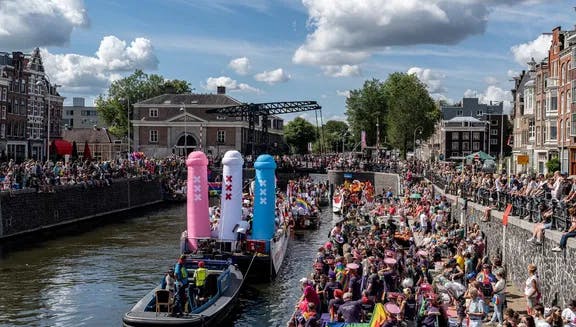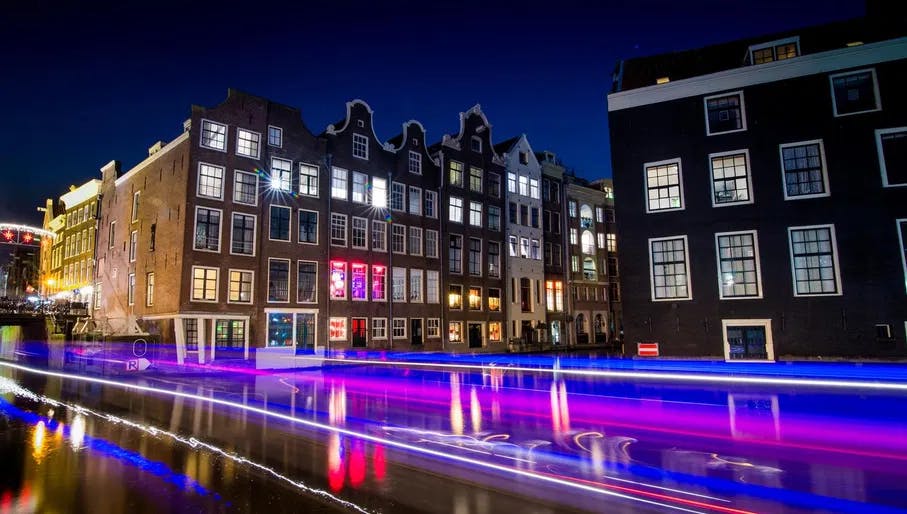
LGBTQI+ safety and resources in Amsterdam
25 February 2025

Regarding soft drugs such as cannabis, a tolerance policy ("gedoogbeleid") is applied in the Netherlands. This policy means that although the possession and buying of soft drugs are recognised as a violation of the law, you will not be prosecuted if it concerns a maximum amount of five grams of cannabis.
Please note: From 2023, it's illegal for both visitors and Amsterdam residents to use soft drugs in the old city centre (Red Light District, Nieuwmarkt and Dam Square). These areas are marked with signs saying ‘No smoking cannabis in public’. Officers and enforcers can issue possible fines of €100.
Tourists are allowed to buy cannabis in coffeeshops in Amsterdam. To enter, you must be 18 – your ID will be checked. Only purchase from reputable coffeeshops (never from street dealers) and start with a small amount if you are not experienced with cannabis. Never mix soft drug use with alcohol.
Visitors should keep in mind that most venues other than coffeeshops do not allow soft drugs to be consumed on their premises. In other words, you can't smoke cannabis in most clubs or bars, even in smoking areas. Despite the accessibility of weed in Amsterdam, not everyone is a smoker. Always consider the people around you.

The consumption of alcohol is prohibited in the majority of public places (especially in the city centre), but you are naturally welcome to visit one of Amsterdam’s many bars. Never combine drugs with alcohol.
Remember that Amsterdammers live in every neighbourhood, including the Red Light District, Rembrandtplein and Leidseplein. Limit noise and drunkenness, clean up your trash and don't pee in the canals. Return plastic bottles and cans to supermarkets for a deposit.
Please be aware of the local laws and the on-the-spot fines for unacceptable behaviour:

As in the rest of the world, the use and distribution of hard drugs like cocaine, heroin, and ecstasy in Amsterdam is strictly illegal. Possession, dealing, selling, production and most other acts involving any drug is punishable by law. Bringing drugs into a club, bar or festival is prohibited. Visitors are strongly advised to prioritize their well-being. If you do choose to use drugs, be aware of the risks.
Visitors are strongly advised to ignore street dealers, who often sell fake or unsafe drugs. Street dealers may attempt to sell dangerous substances to unsuspecting tourists in popular areas. It is crucial for visitors to understand that buying or using hard drugs not only exposes them to severe legal consequences but also poses significant risks to their health and safety. The quality and purity of substances purchased from street dealers are highly questionable, posing serious health risks such as overdoses, poisoning, or adverse reactions.
For severe drug-related emergencies, seek immediate medical assistance. If someone is not feeling well, don't hesitate to ask for help or call medical services at 112. In the Netherlands, you cannot be prosecuted for offences related to taking drugs after visiting the emergency department.
Jellinek is a leading addiction prevention and treatment centre in the Netherlands. They specialise in providing evidence-based care for a wide range of addictions, including alcohol, drugs, and gambling. Read their advice online for visitors to Amsterdam.

Window brothels, sex clubs and escort agencies can operate legally if the City of Amsterdam has granted them the relevant permits. Everyone is welcome to visit the Red Light District, although if touring the area, be respectful and don’t take photographs or record videos. If you decide to visit a sex worker, practise safe sex and never deal with sex workers under 21 years of age.
Forced sex work is an extremely serious crime. Remain vigilant to indications of forced sex work (such as anxiety, bruises or willingness to have intercourse without a condom) and report any suspicions to the police by calling 0900-8844 /+31 343 578 844 or anonymously on 0800-7000 (from a Dutch phone).
Official guided tours of the Red Light District are not allowed.
During weekends, bars and other catering establishments in the Red Light District must close at 2:00. Access to these entertainment venues is only possible one hour before closing time.
The cobbled streets of the Red Light District (De Wallen) are packed with quirky shops, museums, lively pubs and fantastic restaurants. Read on for more things to do in the Red Light District.